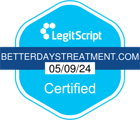Addiction can feel like a chain that binds individuals, restricting their potential, and dimming the light of hope. Yet, within the walls of residential rehab programs, a powerful transformation takes place—one that breaks these chains and guides individuals towards a life of recovery and renewal. In this blog, we delve into the ways in which residential rehab programs serve as a sanctuary for healing, enabling individuals to break free from addiction’s grip and restore their lives.
Understanding Residential Rehab
Residential rehab, also known as inpatient rehab, provides individuals with a structured and immersive environment where they receive comprehensive treatment for addiction. This type of rehab offers 24/7 support, a safe space for healing, and a break from the triggers and temptations of the outside world. It is an intensive approach designed to address the physical, psychological, and emotional aspects of addiction.
Breaking the Cycle of Addiction through Residential Rehab
Detoxification and Physical Healing: The first step in breaking the chains of addiction is detoxification. In a residential rehab setting, medical professionals oversee the detox process, ensuring the safety and comfort of individuals as they rid their bodies of harmful substances. This phase marks the beginning of the physical healing journey.
Therapeutic Interventions: Residential rehab offers a range of evidence-based therapies that aim to uncover the underlying causes of addiction. From individual counseling to group therapy and holistic treatments, individuals gain insights into their triggers, develop coping mechanisms, and address co-occurring mental health issues.
Structured Routine and Accountability: The structured routine of residential rehab provides a sense of stability that may have been absent during the throes of addiction. Regular therapy sessions, wellness activities, and educational workshops create a balanced daily schedule that supports individuals in their journey towards recovery.
Creating New Foundations for Life with Residential Rehab
Holistic Healing: Residential rehab often integrates holistic approaches such as mindfulness, meditation, yoga, and art therapy. These practices promote emotional healing; self-awareness, and personal growth, helping individuals build a strong foundation for sustained sobriety.
Community and Support: Within the residential rehab community, individuals find a sense of camaraderie and shared experience. Bonds formed in group therapy sessions and during shared activities offer a support network that continues long after leaving the program.
Transition and Aftercare: As individuals approach the end of their residential rehab journey, they work closely with their treatment team to create a comprehensive aftercare plan. This plan includes strategies for managing triggers, ongoing therapy, and engagement with support groups, ensuring a smooth transition back to daily life.

